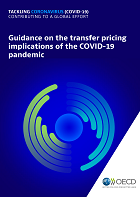Transfer pricing
Guidance on the transfer pricing implications of the COVID-19 pandemic
 |
Access the guidance |
About
This Guidance clarifies and illustrates the practical application of the arm's length principle as articulated in the OECD Transfer Pricing Guidelines to the unique fact patterns and specific challenges implied by the COVID-19 pandemic. It was developed and approved by the 137 members of the OECD/G20 Inclusive Framework on Base Erosion and Profit Shifting (Inclusive Framework).
Embodied in the OECD's Committee on Fiscal Affairs (CFA), the Inclusive Framework was developed in 2013 to allow interested countries and jurisdictions to work with OECD and G20 members on equal footing on developing standards on base erosion and profit shifting (BEPS) related issues and reviewing and monitoring the implementation of the BEPS Package. See full list of Inclusive Framework members.
The overarching objective of the CFA is to contribute to the shaping of globalisation for the benefit of all through the promotion and development of effective and sound tax policies, international tax standards and guidance that will allow governments to provide better services to their citizens while maximising economic growth and achieving environmental and social objectives. Its work is intended to enable OECD and non-OECD member governments to improve the design and operation of their national tax systems, to promote co-operation and co-ordination among them in the area of taxation and to reduce tax barriers to international trade and investment. (See CFA Mandate).
To meet this objective, the CFA agreed, among other things, to enhance co-operation by strengthening policy dialogue with non-OECD members in order to increase their awareness and use of the CFA's standards, guidelines and to explore together the identification of good practices. It is in this context, and the overarching need for inclusiveness, that the Inclusive Framework members developed and approved this Guidance.
The Guidance provides much needed clarification and support for taxpayers and for tax administrations as they evaluate and administer the application of transfer pricing rules for periods impacted by the COVID-19 pandemic, an area where international co-ordination is necessary. Four priority issues were identified and are covered in the Guidance:
(i) comparability analysis;
(ii) losses and the allocation of COVID-19 specific costs;
(iii) government assistance programmes; and
(iv) advance pricing agreements ("APAs").
While it is recognised that some developing country Inclusive Framework members may also follow the United Nations Practical Manual on Transfer Pricing for Developing Countries (2017), this Guidance should be helpful in such circumstances where the UN Manual follows a similar analytical framework and allows for similar conclusions as the OECD Transfer Pricing Guidelines.
FURTHER reading
- Blog post: Transfer pricing implications of the COVID-19 pandemic: New OECD guidance for tax administrations and business, by Grace Perez-Navarro, Deputy Director of the OECD Centre for Tax Policy and Administration (18 December 2020)
- OECD work on transfer pricing
- OECD contributions to tackle the coronavirus (COVID-19)
ENGAGE
- Sign-up to our newsletter
- Follow-us on Twitter: @OECDtax
- Contact us: ctp.contact@oecd.org
Related Documents